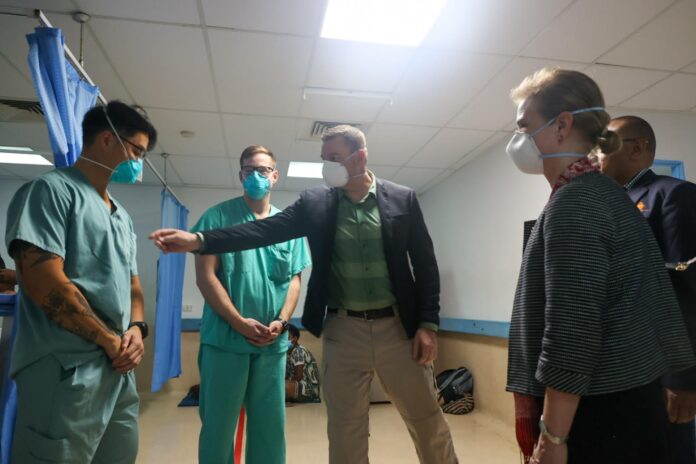THE United States Army 18th Medical Command deployed ten of its 8th Forward Resuscitative and Surgical Detachment (FRSD) doctors, nurses, and medical technicians from Hawaii to work in Port Moresby General Hospital for a week treating patients, training PNG doctors, and learning how to care for patients with medical issues not commonly found in the United States.
At a press conference on Wednesday, US Embassy Charge d’Affaires Katherine Monohan met the Forward Resuscitative and Surgical Detachment and toured the hospital, hosted by POMGEN chief executive officer Dr. Paki Molumi.
During her remarks, Monohan said: “This is such a perfect example of the US-PNG relationship because for us its’ about the people. We are fully dedicated to this partnership; we understand there’s a lot we can do together.”
US Army Lt. Col. Andrew Galdi, the commander of 8th FRSD, also talked about their mission in PNG.
“The mission for our unit is to establish a trauma and surgical … platform in the Pacific,” Galdi said.
“The goal of the rotation is to build interoperability by working alongside our Papua New Guinea medical partners to provide both sides with an exchange of medical expertise in very high volume, unpredictable trauma scenarios in a resource constrained environment.”
“The hospital is the largest in the country with a bed capacity of about 1,000 beds,” POMGEN director of Medical Services Dr Kone Sobi said.
“With the surrounding population, the occupation is usually around 90-95% so there is a challenge for us to keep a quick and fast turnaround for our patients we are admitting for various clinical conditions.
“The population of PNG is growing at a rate of 3.1 percent,” the 20-year tenured POMGEN director continued.
“It’s like aiding another million people with the current population of 11.8 million, 3.1% translates into a million people in just under three years so that’s a huge challenge for Port Moresby in particular being the only large public hospital.”
Sobi said there are other smaller clinics in the country, but POMGEN takes on patients outside its higher level of care designation.
“We are meant to deliver highly specialised care but that is not simply possible,” he said.
“We have to see primary and secondary care so it’s a huge challenge for us to deliver a level of best healthcare.”
Sending the 8th FRSD to work alongside the medical administrators and staff at Port of Moresby General Hospital was lauded as a mutually beneficial relationship.
“I think it’s an amazing opportunity,” US Army Sgt. 1st Class Stephanie Grewell, the detachment sergeant for 8th FRSD said.
“Offering our trauma surgeons, our nurses, our combat medics, even our ancillary services the ability to work in (POMGEN) Hospital — in this region — is something that you can’t replace in the (simulation) lab. “The patient population is completely different,” US Army Capt. Brian Cheung, an emergency nurse with 8th FRSD.
“They presented significant pathologies that are really different from the patients we normally take care of back at home.
“Being here at POMGEN Hospital, we are definitely learning a lot from the people that work here,” he said.
“They work in a more austere environment than we are acclimated to — working at military treatment facilities. They kind of correlate to our objectives on the forward resuscitative surgical detachment where we are meant to operate within these environments with little or no support at all.”
Cheung said they detachment was also learning how to operate with scarce resources while “managing more acute patients with less”.
“This mission for the 8th FRSD is really building readiness and capability for providing real-world medical treatment in a foreign country that has varying natural and manmade threats,” said Galdi.
“Our world-class medical professionals with varying skillsets are ready to meet the highly demanding challenges in both traditional and austere environments.”
The 8th FRSD also purchased and donated $25,000 of medical items for POMGEN Hospital to help increase its capacity to treat patients. Sobi said POMGEN Hospital is grateful for the donation of medical supplies, equivalent to 100,000 Papua New Guinean Kina. “We are really enhancing Papua New Guinea’s medical capacity by making this physical contribution to purchase consumable medical items … like IV tubing, bandages, sutures — things that are utilized very highly to help extend their ability to continue to provide medical services to this growing population that is really outpacing the infrastructure and the equipment that this hospital can provide them.
“We still have huge gaps to cover but this will be a significant contribution from your team and from the government of the United States,” he said.
Trauma rotations are not new to U.S. Army Medicine. Sobi expressed his desire to have a continued civilian-military relationship to build on what was a first-of-its-kind mission for Papua New Guinea.
“We look forward to (an) ongoing partnership with Andrew (Galdi) and your team,” Sobi said.


